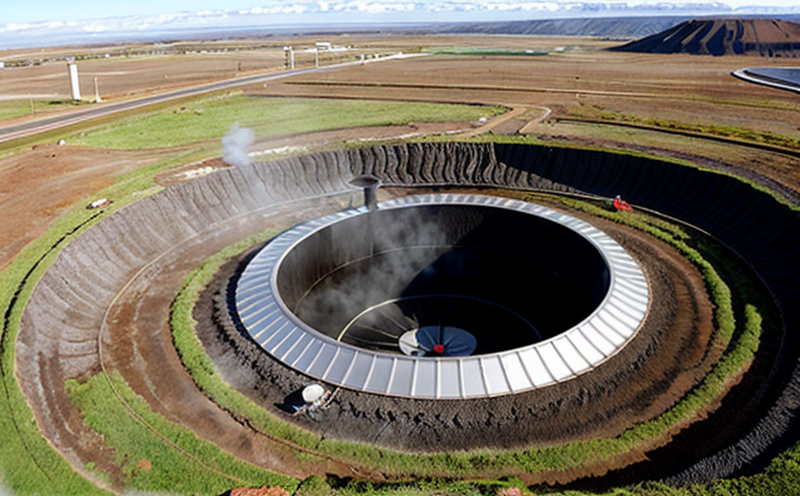IEC 61000 Electromagnetic Compatibility Testing of Geothermal Plants
The International Electrotechnical Commission (IEC) standard IEC 61000 addresses electromagnetic compatibility (EMC) in the electrical and electronic environment. This standard is crucial for ensuring that geothermal energy systems operate reliably without causing or being affected by electromagnetic interference.
In a geothermal plant, the complex environment includes high-voltage transmission lines, transformers, and various electronic control systems. EMC testing ensures that these components function correctly under varying conditions of electromagnetic disturbance. This is essential for the safe and efficient operation of the plant as well as compliance with international regulations.
EMC testing typically involves both conducted emissions (CE) and radiated emissions (RE). CE tests measure the electrical noise emitted by equipment, while RE tests assess the radio frequency interference that a device generates. For geothermal plants, this includes testing inverters, transformers, and other critical components.
The testing process begins with a thorough review of the system’s design to identify potential sources of electromagnetic interference. This involves examining circuit diagrams, component specifications, and layout schematics. From there, test engineers select appropriate test setups that replicate real-world operating conditions. Common test procedures include:
- Conducted emission tests (CE1 to CE4)
- Radiated emission tests (RE1 to RE3)
- Electrostatic discharge immunity testing
- Surge voltage protection assessment
The testing process is highly technical and involves specialized equipment. The laboratory uses Class A, B, or C test chambers depending on the specific requirements of the geothermal plant being tested. Test engineers carefully monitor all parameters to ensure compliance with IEC 61000 standards.
Once testing is complete, detailed reports are generated that document every aspect of the testing process and results. These reports serve as a comprehensive record for quality managers, R&D teams, and other stakeholders involved in maintaining and optimizing the geothermal plant's performance.
| Test Procedure | Description |
|---|---|
| CE1 - Radiated Emissions Test | This test evaluates the ability of the device to operate within specified limits when exposed to electromagnetic fields. |
| RE2 - Immunity to Electrostatic Discharge | This test assesses how well the device can function after being subjected to an electrostatic discharge event. |
Why It Matters
The importance of EMC testing in geothermal plants cannot be overstated. Electromagnetic interference can lead to operational disruptions, safety hazards, and even damage to sensitive equipment. By ensuring that all components meet the stringent requirements set forth by IEC 61000, we help prevent these issues from arising.
For quality managers and R&D engineers, EMC testing provides critical insights into how different parts of the geothermal system interact with one another. This knowledge is invaluable for identifying potential improvements and optimizing overall performance. Compliance officers benefit from having clear evidence that all systems meet regulatory standards, which can help avoid costly fines or delays.
From a broader perspective, ensuring robust EMC testing contributes to the reliability and sustainability of geothermal energy production. By minimizing electromagnetic interference, we support the development of cleaner, more efficient renewable energy solutions.
Competitive Advantage and Market Impact
In a competitive market for renewable energy technologies, ensuring high levels of quality control is key to standing out. By offering comprehensive EMC testing services tailored specifically to geothermal plants, we provide our clients with an edge in terms of both product reliability and regulatory compliance.
Our expertise allows us to offer insights that go beyond basic testing, helping clients make informed decisions about their equipment selection and design modifications. This proactive approach can lead to significant cost savings by preventing costly rework or replacements down the line.
In terms of market impact, our commitment to excellence in EMC testing contributes positively to the reputation of geothermal energy as a reliable source of power. As more countries adopt stringent environmental policies, having partners who understand and adhere to these standards becomes increasingly important for businesses operating within those markets.
Use Cases and Application Examples
| Application Case | Description |
|---|---|
| Inverter Testing for Geothermal Plants | We test inverters used in geothermal plants to ensure they meet IEC 61000 standards, helping to prevent malfunctions and improve overall system reliability. |
| Transformer Immunity Assessment | This involves assessing transformers within a geothermal plant to determine their ability to withstand electromagnetic interference without compromising performance or safety. |
- Inverter Testing for Geothermal Plants: By conducting thorough EMC testing on inverters, we help ensure they operate efficiently and safely in the challenging environment of geothermal plants.
- Transformer Immunity Assessment: Ensuring transformers within a geothermal plant can withstand electromagnetic interference is critical for maintaining reliable power generation.
Inverter Testing for Geothermal Plants: Inverter testing ensures that inverters used in geothermal plants function properly under various environmental conditions. This includes assessing their ability to handle high levels of conducted emissions and radiated emissions. The tests also evaluate how well the inverters can maintain stable output power despite external electromagnetic interference.
Transformer Immunity Assessment: Transformers within a geothermal plant are subject to harsh operating environments, which may include strong magnetic fields from nearby electrical equipment and potential disruptions caused by lightning strikes. By conducting immunity assessments on these transformers, we help ensure they can withstand such challenges without compromising performance or safety.





